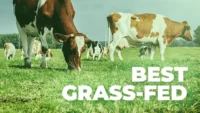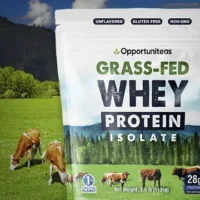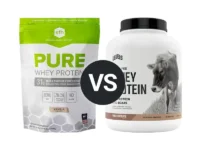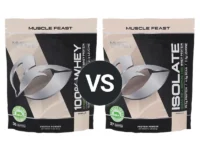Knowledge BaseYou're Questions Answered
BACK
What does 100% grass-fed whey mean?
The term "100% grass-fed whey" refers to whey protein that is derived from the milk of cows that have been exclusively fed on a grass-based diet throughout their lives. This label indicates that the cows were not fed grains or other types of feed commonly used in conventional farming practices. Below, we explore what this term means, the benefits of grass-fed whey, and considerations for consumers.
Understanding 100% Grass-Fed Whey
- Grass-Fed Diet
100% grass-fed whey comes from cows that graze on pasture and consume a diet primarily composed of fresh grass or hay. This type of feeding is more natural for cows compared to grain-based diets often used in conventional dairy farming. The grass-fed label indicates that no grains, soy, or other feed supplements were used in the cows' diet. - Whey Protein Production
Whey protein is a byproduct of cheese-making, where milk is separated into curds and whey. In the case of 100% grass-fed whey, the milk used in this process comes exclusively from grass-fed cows. The whey is then processed into protein powder, which retains the nutritional benefits associated with grass-fed milk.
Benefits of 100% Grass-Fed Whey
- Higher Nutrient Content
Grass-fed whey is often considered nutritionally superior to conventional whey protein. Milk from grass-fed cows has been shown to contain higher levels of certain nutrients, such as omega-3 fatty acids, conjugated linoleic acid (CLA), and fat-soluble vitamins like vitamin A and vitamin E. These nutrients can contribute to overall health and well-being1. - Better Fatty Acid Profile
The fatty acid profile of grass-fed milk is generally more favorable, with a higher ratio of omega-3 to omega-6 fatty acids. Omega-3 fatty acids are known for their anti-inflammatory properties, which can be beneficial for heart health, cognitive function, and overall wellness2. - Environmental and Ethical Considerations
Grass-fed farming practices are often more sustainable and environmentally friendly compared to conventional farming. Cows on a grass-fed diet are typically raised in more humane conditions, with access to open pastures, which can be important for consumers concerned with animal welfare and environmental impact. - Fewer Additives and Hormones
Cows raised on a 100% grass-fed diet are less likely to be treated with growth hormones or antibiotics compared to conventionally raised cows. This can result in a cleaner, more natural whey protein product that appeals to health-conscious consumers looking to avoid synthetic additives.
Considerations
- Cost
100% grass-fed whey protein is typically more expensive than conventional whey protein due to the higher costs associated with grass-fed dairy farming. Consumers should weigh the potential nutritional benefits and ethical considerations against the higher price. - Label Verification
It is important to verify the authenticity of the "100% grass-fed" claim by checking for third-party certifications or endorsements on the product label. Some products may use misleading marketing, so ensuring that the whey is genuinely sourced from 100% grass-fed cows is crucial. - Availability
100% grass-fed whey protein may be less widely available compared to conventional whey protein. Consumers may need to seek out specialized retailers or online stores to find authentic grass-fed whey products.
Was this answer helpful? Let us know!
Like
Add to this Answer
Related Questions
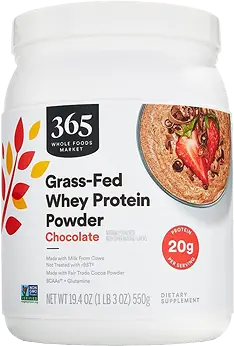
Disclosure
Your Answer
Do you have a suggestion to improve the answer? Please detail your suggestions and provide any references to information that may support your answer if available.
The content on this site has not been written, reviewed or endorsed by a medical professional. We assume no liability for the misuse of supplements and recommend you review the label of any product, as well as consulting with your health care professional.
We are a participant in the Amazon Services LLC Associates Program, an affiliate advertising program designed to provide a means for us to earn fees by linking to Amazon.com and affiliated sites.
We are a participant in the Amazon Services LLC Associates Program, an affiliate advertising program designed to provide a means for us to earn fees by linking to Amazon.com and affiliated sites.
© 2026 ProteinPowder.com
